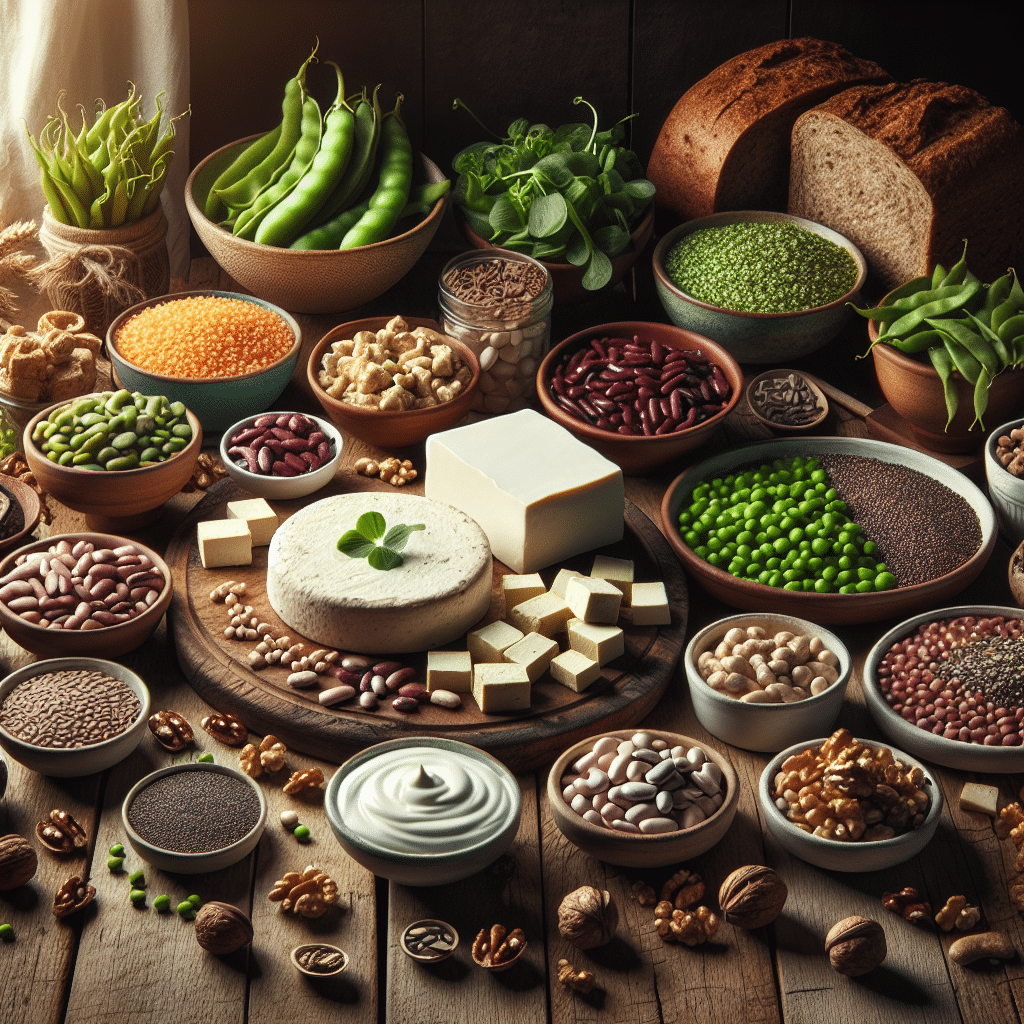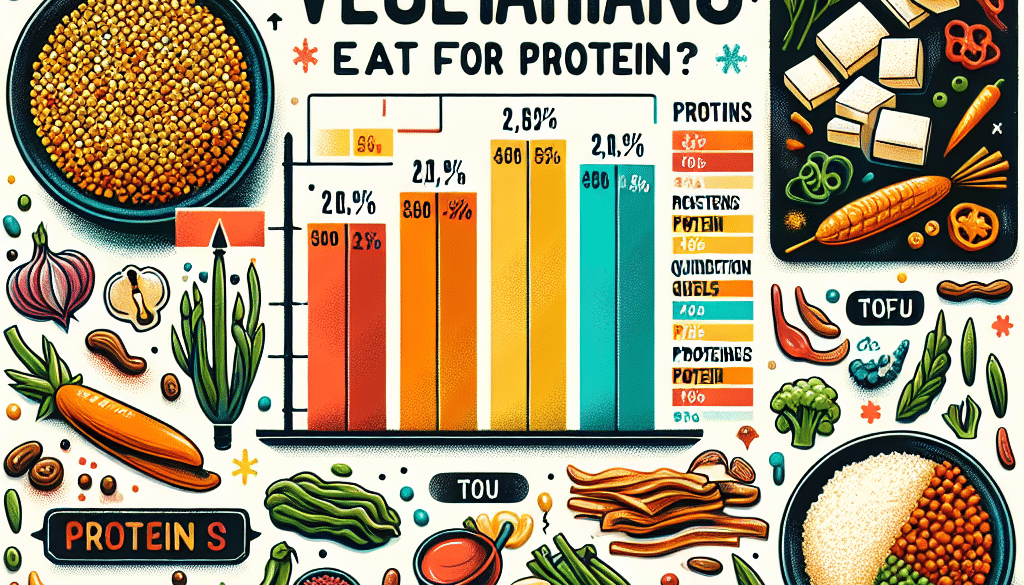What Do Vegetarians Eat For Protein?
-
Table of Contents
- Vegetarian Protein Sources: A Comprehensive Guide
- Understanding Protein Requirements for Vegetarians
- Legumes: A Powerhouse of Vegetarian Protein
- Whole Grains: More Than Just Fiber
- Nuts and Seeds: Nutrient-Dense Protein Snacks
- Dairy Alternatives: Plant-Based Protein Sources
- Soy Products: Versatile and Protein-Rich
- Protein-Rich Vegetables
- Conclusion: A Balanced Vegetarian Diet for Protein
- ETprotein: Your Source for High-Quality Vegetarian Proteins
Vegetarian Protein Sources: A Comprehensive Guide

Protein is a crucial macronutrient that plays a vital role in building muscle, repairing tissue, and producing enzymes and hormones. While meat is often considered a primary source of protein, vegetarians have a rich variety of protein-rich foods to choose from. This article explores the diverse options available to vegetarians for meeting their protein needs.
Understanding Protein Requirements for Vegetarians
Before diving into the sources of vegetarian protein, it’s important to understand how much protein is needed. The Recommended Dietary Allowance (RDA) for protein is 0.8 grams per kilogram of body weight per day for adults. However, individual requirements may vary based on factors such as age, sex, and level of physical activity.
Legumes: A Powerhouse of Vegetarian Protein
- Lentils: With about 18 grams of protein per cooked cup, lentils are a staple in vegetarian diets.
- Chickpeas: Offering around 15 grams of protein per cooked cup, chickpeas are versatile and can be used in a variety of dishes.
- Black Beans: These beans provide about 15 grams of protein per cooked cup and are rich in fiber.
- Peas: A cup of cooked peas has roughly 8 grams of protein, making them a great addition to meals.
Legumes are not only high in protein but also contain essential amino acids, making them an excellent choice for vegetarians.
Whole Grains: More Than Just Fiber
- Quinoa: With 8 grams of protein per cooked cup, quinoa is a complete protein, containing all nine essential amino acids.
- Oats: A comforting bowl of oatmeal offers about 6 grams of protein per cooked cup.
- Brown Rice: While not as high in protein as quinoa, brown rice provides about 5 grams per cooked cup.
- Whole Wheat Pasta: A serving can have up to 7 grams of protein, plus the added benefit of complex carbohydrates.
Whole grains are an important part of a vegetarian diet, providing both protein and other nutrients.
Nuts and Seeds: Nutrient-Dense Protein Snacks
- Almonds: With 6 grams of protein per ounce, almonds are a great snack or salad topping.
- Chia Seeds: These tiny seeds pack about 5 grams of protein per ounce, along with omega-3 fatty acids.
- Pumpkin Seeds: Also known as pepitas, they offer about 7 grams of protein per ounce.
- Hemp Seeds: With roughly 10 grams of protein per ounce, hemp seeds are a strong protein source.
Nuts and seeds are not only high in protein but also contain healthy fats and vitamins.
Dairy Alternatives: Plant-Based Protein Sources
- Soy Milk: A cup of soy milk can contain 7 to 12 grams of protein, depending on the brand.
- Almond Milk: While lower in protein than soy milk, it’s a good option for those with soy allergies.
- Coconut Yogurt: Some brands fortify their coconut yogurt with plant-based proteins.
- Cashew Cheese: Nut-based cheeses can be a source of protein, though they vary widely in content.
Plant-based dairy alternatives are increasingly available and can be a good source of protein for vegetarians.
Soy Products: Versatile and Protein-Rich
- Tofu: With about 10 grams of protein per half-cup serving, tofu is incredibly versatile.
- Tempeh: Made from fermented soybeans, tempeh has about 15 grams of protein per half-cup.
- Edamame: These young soybeans have about 8 grams of protein per half-cup serving.
Soy products are a staple in many vegetarian diets due to their high protein content and flexibility in cooking.
Protein-Rich Vegetables
- Broccoli: A cup of chopped broccoli has about 3 grams of protein.
- Spinach: A cup of cooked spinach contains about 5 grams of protein.
- Asparagus: With 3 grams of protein per cup, asparagus is a great side dish.
While vegetables are not as high in protein as legumes or nuts, they contribute to the overall protein intake and provide a range of other nutrients.
Conclusion: A Balanced Vegetarian Diet for Protein
Vegetarians can easily meet their protein needs by incorporating a variety of legumes, whole grains, nuts, seeds, dairy alternatives, soy products, and vegetables into their diet. By understanding the protein content of these foods and planning meals accordingly, vegetarians can ensure they are getting enough of this essential macronutrient.
ETprotein: Your Source for High-Quality Vegetarian Proteins
If you’re looking for high-quality vegetarian protein sources, ETprotein offers a range of organic bulk vegan proteins that are perfect for supplementing a vegetarian diet. Their products include organic rice protein, pea protein, and various seed proteins, all characterized by a neutral taste and non-GMO, allergen-free attributes. With L-(+)-Ergothioneine purity over 98%, ETprotein caters to a diverse range of industries and dietary needs. For more information or to sample their products, please contact ETprotein.
About ETprotein:
ETprotein, a reputable protein and L-(+)-Ergothioneine (EGT) Chinese factory manufacturer and supplier, is renowned for producing, stocking, exporting, and delivering the highest quality organic bulk vegan proteins and L-(+)-Ergothioneine. They include Organic rice protein, clear rice protein, pea protein, clear pea protein, watermelon seed protein, pumpkin seed protein, sunflower seed protein, mung bean protein, peanut protein, and L-(+)-Ergothioneine EGT Pharmaceutical grade, L-(+)-Ergothioneine EGT food grade, L-(+)-Ergothioneine EGT cosmetic grade, L-(+)-Ergothioneine EGT reference grade and L-(+)-Ergothioneine EGT standard. Their offerings, characterized by a neutral taste, non-GMO, allergen-free attributes, with L-(+)-Ergothioneine purity over 98%, 99%, cater to a diverse range of industries. They serve nutraceutical, pharmaceutical, cosmeceutical, veterinary, as well as food and beverage finished product distributors, traders, and manufacturers across Europe, USA, Canada, Australia, Thailand, Japan, Korea, Brazil, and Chile, among others.
ETprotein specialization includes exporting and delivering tailor-made protein powder and finished nutritional supplements. Their extensive product range covers sectors like Food and Beverage, Sports Nutrition, Weight Management, Dietary Supplements, Health and Wellness Products, and Infant Formula, ensuring comprehensive solutions to meet all your protein needs.
As a trusted company by leading global food and beverage brands and Fortune 500 companies, ETprotein reinforces China’s reputation in the global arena. For more information or to sample their products, please contact them and email sales(at)ETprotein.com today.












